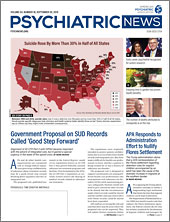Lithium is considered a gold-standard therapy for bipolar disorder in adults, given its ability to both treat mood symptoms and suicidal ideation. (It is one of the few available psychiatric medications that has demonstrated effectiveness to prevent suicide). Far less direct evidence for lithium’s effectiveness in children and adolescents is available, outside of mania, and many physicians are still hesitant to prescribe this medication to youth.
A study published July 29 in the Journal of the American Academy of Child & Adolescent Psychiatry now reports that youth with bipolar disorder who take lithium are half as likely to attempt suicide than those who take other mood stabilizers. Youth taking lithium also showed other mental health benefits such as reduced depression, less aggression, and better social functioning.
Though the study was retrospective, its findings mirror what has been reported in adult studies, noted lead author Danella Hafeman, M.D., Ph.D., an assistant professor of psychiatry at the University of Pittsburgh (UP) and a child psychiatrist in the Child and Adolescent Bipolar Services clinic at UP Medical Center. “It would be wonderful to get some prospective data, which we hope will be a next step,” she added. “But this study does offer some real-world data on how lithium compares with other medications children may be prescribed.”
These findings come courtesy of the Course and Outcome of Bipolar Youth (COBY) study, a longitudinal study that followed over 400 youth (aged 7 to 17 years at the time of enrollment) diagnosed with bipolar disorder over four years. At six-month intervals, the study investigators assessed each youth on his or her medication history and fluctuations in mood and behavior, including suicidal behaviors, among other variables.
For the current study, the investigators limited their analysis to the six-month periods in which participants took lithium and/or other mood stabilizers, including valproate, lamotrigine, or second-generation antipsychotics, for at least 75% of the time. The final sample included 340 participants and 2,638 six-month “blocks,” of which 886 involved lithium use and 1,752 involved the use of another mood stabilizer.
Hafeman and colleagues confirmed 17 suicide attempts when youth were taking lithium (1.9% of lithium blocks) and 63 attempts when youth were taking another mood stabilizer (3.6% of other mood-stabilizer blocks). After adjusting for demographic differences between the groups, youth taking lithium were about half as likely to attempt suicide as those taking other medications. Youth taking lithium also reported lower scores on assessments for depressive symptoms and aggression as well as less social impairment relative to youth taking other medications. Lithium did not reduce the risk of being admitted to a hospital, nor was it superior to other mood stabilizers at preventing manic episodes.
Given that older COBY participants transitioned to adulthood during the four-year follow-up, it is possible that these positive effects might just reflect lithium’s known benefits in the adult population. However, when using only data from periods when participants were aged 17 years or younger, the investigators still found similar results.
Hafeman acknowledged that an observational study like COBY cannot account for as many variables as a controlled clinical trial. Likewise, the researchers did not have detailed information on the participants’ dosages or their adherence rates. Despite that, she thinks the results show lithium is a viable treatment option for children and adolescents with bipolar disorder.
“While clinical trials are near and dear to my heart, this is an excellent study that complements clinical trial data and further suggests lithium’s effectiveness in this population,” concurred Robert Findling, M.D., M.B.A., the Leonard and Helen R. Stulman Professor and director of Child and Adolescent Psychiatry at Johns Hopkins University.
Findling cautioned that physicians should not over-infer the results. “I would not consider lithium the automatic go-to for youth at elevated risk of suicidal behaviors,” he said. “Suicide attempts by medication overdose are not uncommon events in at-risk youngsters. For this reason, careful consideration should be made with lithium when prescribing it to this vulnerable population due to the drug's narrow therapeutic window.”
At the same time, he thinks more physicians should at least bring lithium to the table when making treatment decisions regarding youth with bipolar disorder. Even after the Food and Drug Administration updated the drug label for lithium in late 2018 to include detailed dosing instructions for children, this medication remains somewhat underused, Findling noted.
This study was supported by grants from the National Institute of Mental Health. ■
Lithium Versus Other Mood-Stabilizing Medications in a Longitudinal Study of Bipolar Youth” is posted
here.

